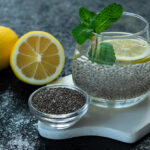How these tiny seeds pack a punch against heart disease
 (NaturalHealth365) Heart disease – which encompasses coronary heart disease, heart failure, stroke, and hypertension – is the leading cause of death worldwide. Also known as cardiovascular disease (CVD), heart disease shows no sign of loosening its deadly grip any time soon. For example, the American Heart Association (AHA) predicts that a stunning 40 percent of the U.S. adult population will have some type of CVD by the year 2030.
(NaturalHealth365) Heart disease – which encompasses coronary heart disease, heart failure, stroke, and hypertension – is the leading cause of death worldwide. Also known as cardiovascular disease (CVD), heart disease shows no sign of loosening its deadly grip any time soon. For example, the American Heart Association (AHA) predicts that a stunning 40 percent of the U.S. adult population will have some type of CVD by the year 2030.
The AHA lists “unhealthy dietary selections” as a primary cause of heart disease and recommends “reverting to natural dietary sources.” (Haven’t holistic doctors been advising this for decades?)
According to new research published in Nutrition Reviews, chia seeds could be the ultimate heart-healthy snack. Let’s see what makes the chia seed such a powerful functional food.
Chia seed may help lower blood pressure
The researchers, who conducted a systematic review of prior studies up to 2023, concluded that chia seed may help reduce both systolic and diastolic high blood pressure – in some studies, by as much as 10 points mm/Hg. (Systolic blood pressure, the top number, refers to the force exerted on blood vessels during heartbeats. The bottom, or diastolic, number refers to the pressure in between beats).
High blood pressure is a risk factor for heart disease. The authors added that the blood pressure-lowering effect seemed most pronounced in participants with baseline systolic readings under 140 mm/Hg. Although 10 points may not sound like much, it can be meaningful.
While chia seeds helped to lower blood pressure, they did not appear to reduce weight, body fat, or blood sugar levels. Noting that the small number of eligible studies limited their findings, the review authors called for more research using larger sample sizes.
Chia seed is a “therapeutic weapon” in metabolic disorders
Earlier studies have shown chia seeds’ positive effects on metabolic factors. In a 2022 review published in Food Science and Nutrition, scientists credited chia seed with combating heart disease by lowering blood pressure, reducing harmful LDL cholesterol, and regulating blood sugar.
In addition, they noted that chia seeds have antioxidant and anti-inflammatory effects that can protect the insulin-producing beta cells of the pancreas. Like the authors of the new review, these researchers concluded that this nutrient can be a powerful ally against heart disease, declaring that “Chia seeds’ content of omega-3 fatty acids and antioxidants can be used as a functional component aid in reducing the risk of CVD.”
Access the plant-based “powerhouse” of omega-3 fatty acids
When it comes to beneficial fatty acids, protein, and fiber, the chia seed is the best source on the planet. 65 percent of the oil in each chia seed consists of anti-inflammatory omega-3s (in the form of alpha-linolenic acid). Also present is heart-healthy omega-6 (in the form of linoleic acid). Chia seeds also contribute a long list of “all-star” antioxidants – such as chlorogenic acid, caffeic acid, myricetin, quercetin, and kaempferol – to help scavenge harmful free radicals.
And their content of dietary fiber leaves other “supergrains,” such as quinoa, amaranth, and flaxseed, in the dust. A 100-gram serving of chia seeds provides 35 to 40 grams of fiber – enough to fulfill the entire adult daily requirement. These mighty morsels also contain more protein per serving than oats, barley, corn, or rice and are rich in bone-building calcium, phosphorus, and magnesium.
Chia seeds are easy to incorporate into recipes
Chia seed, botanically known as Salvia hispanica, is an ancient source of nutrition and was an important staple in the diets of the ancient Aztec and Mayan civilizations. As it turns out, organic chia seed can be equally at home in 21st century kitchens and recipes.
Chia seeds do not need to be cooked, soaked, or shelled. Their mild, pleasant taste will not overwhelm other flavors. Sprinkle them over salads, use them in smoothies, stir them into yogurt, cereals, oatmeal, and cottage cheese, or add them to baked goods and casseroles.
To make chia pudding, simply combine two tablespoons of chia seeds with half a cup of organic almond or oat milk. (Sweeten it with a teaspoon of organic raw honey or maple syrup if desired). Refrigerate for a few hours, then top with your favorite organic berries or nuts – and enjoy.
By the way, an ounce of chia seeds equals about two tablespoons. Because of their high fiber content, chia seeds can cause bloating and digestive discomfort if consumed in large amounts. Holistic healthcare providers generally advise starting with two or three tablespoons daily, consumed with plenty of water.
Of course, no single food is a “magic bullet” against heart disease or any other condition. Lifestyle and exercise habits also play a role. But, in the words of the researchers, “the huge potential of chia seeds (should) make them part of an average diet for better health and longevity.” In other words, the miniscule-but-mighty chia seed is not to be overlooked.
Sources for this article include:



